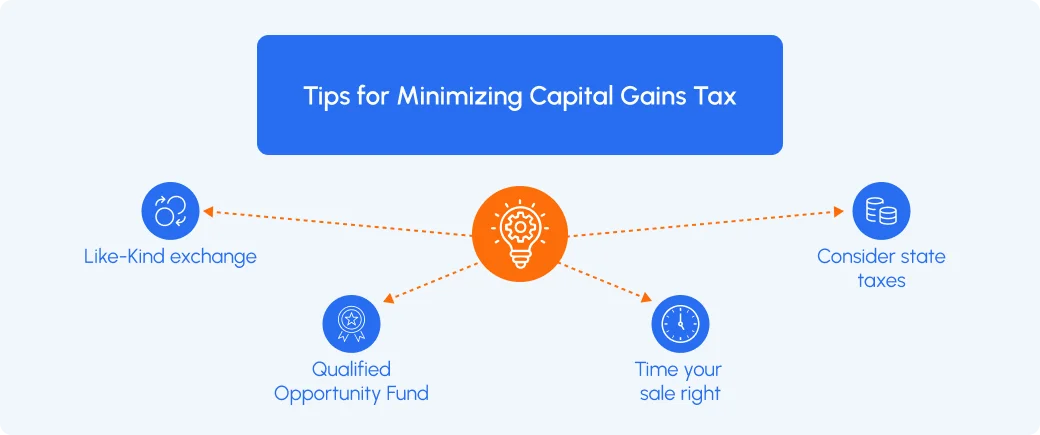Capital gains taxes on commercial real estate are payable when an investor sells a property at a profit. You must understand the nuances of how this tax works. If you do your homework carefully and come to grips with the capital gains tax calculations, you can reduce your capital gains tax bill by a significant sum.
Key Takeaways
- Holding property over one year qualifies investors for long-term capital gains tax rates (0%–20%), which are significantly lower than short-term rates (10%–37%).
- 1031 exchanges allow deferral of capital gains taxes by reinvesting sale proceeds into like-kind properties within a strict 45- and 180-day timeline.
- Opportunity Zones and trusts like QOFs, Deferred Sales Trusts, and Charitable Remainder Trusts enable strategic deferral or reduction of capital gains tax through structured reinvestment or donation.
- Depreciation recapture can trigger a 25% tax rate on previous deductions, making cost segregation studies crucial for optimizing long-term tax efficiency.
- State tax considerations are essential, as states like California and New York impose substantial capital gains taxes, unlike tax-free states such as Texas and Florida.
What is the capital gains tax?
Federal capital gains taxes are payable by commercial real estate investors when they sell property at a profit. This tax is calculated based on several factors, including the investor’s tax filing status, taxable income, and the period for which the investor owned the commercial real estate.
Capital gains form part of your taxable income and you must report them on your federal tax return. Additionally, some states tax capital gains too. Consequently, the sale of commercial property may result in the payment of federal capital gains taxes as well as state taxes.
Why capital gains taxes matter in commercial real estate
Commercial real estate investors must familiarize themselves with the capital gains taxes computation methodology. Additionally, investors should understand capital gains taxes and how they work before investing.
So, how can you minimize your capital gains tax bill when you sell commercial property? Some of the factors that impact the capital gains tax calculation, which we will go into in subsequent sections of this article, are:
- The period for which real estate investors have owned the commercial property: This will determine whether commercial real estate investors pay short-term or long-term capital gains taxes. (Yes, there is usually a significant difference between the two).
- What commercial real estate investors do with the sale proceeds from the commercial property: It’s possible to defer paying capital gains taxes if you invest the money you get from the sale in another like-kind property.
There’s another way to defer capital gains taxes. You could invest the profit you made when you sold the commercial property in a Qualified Opportunity Fund (QOF). A QOF is an investment vehicle that invests in real estate and businesses in one of the 8,764 Opportunity Zones, which are low-income communities across the United States.
- The state where real estate investors purchase commercial property: The sale of commercial real estate may incur state capital gains taxes or state income taxes in addition to federal capital gains taxes. Some states – Arizona, Florida, and Texas, to name a few – don’t require you to pay capital gains taxes. Others like California, New Jersey, and New York do.
How is capital gains tax on commercial real estate calculated?
Capital gains taxes are calculated as a percentage of the profit you make when you sell a commercial property.
Short-term capital gains on commercial real estate are generally taxed at the same rate as ordinary income. So, an investor would pay between 10% and 37% as federal capital gains taxes for properties held for a year or less. The level of taxable income of the investor determines the tax percentage.
Federal long-term capital gains tax rates are lower than short-term rates. The applicable tax rates start at 0% (long-term capital gains taxes are not applicable up to a specific limit) and go up to a maximum of 20%. It makes sense to hold on to your property for at least a year before selling. If you do this, you could save a significant sum in capital gains taxes.
Did You Know?
Short-term gains on CRE are taxed up to 37% federally, while long-term gains cap at 20% for the highest long-term capital gains tax rate, a potential 17-point swing in your tax hit depending on hold period (IRS, 2025 tax tables).
Long-term vs. short-term capital gains tax rates
The capital gains taxes you pay on an investment property fall into two categories:
Short-term capital gains
If you sell a commercial property that you have held for one year or less, you must pay short-term capital gains taxes. Remember that short-term capital gains are taxed in the same manner as ordinary income.
Long-term capital gains
If you sell a commercial property you have held for over a year, you must pay long-term capital gains taxes.
The following table provides the federal income tax rates for a single filer. A single filer is a taxpayer who files a federal income tax return under the status “single” – unmarried taxpayers use this category, as well as for married couples filing jointly.
Short-term federal capital gains tax rates for single filers and married couples filing jointly for the 2025 tax year
| Income level of single filer | Income level of married couple filing jointly | Short-term capital gains tax rate |
| Up to $11,925 | $23,850 | 10% |
| $11,926 to $48,475 | $23,851 to $96,950 | 12% |
| $48,476 to $103,350 | $96,951 to $206,700 | 22% |
| $103,351 to $197,300 | $206,701 to $394,600 | 24% |
| $197,301 to $250,525 | $394,601 to $501,050 | 32% |
| $250,526 to $626,350 | $501,051 to $751,600 | 35% |
| Above $626,350 | Above $751,600 | 37% |
Source: IRS
Note: You can find the short-term tax rates for Married Couples Filing Separately and for Head of Household filers online.
Long-term capital gains are taxed at a lower rate. Here’s a table providing the details of the long-term capital gains tax rates for single filers and married couples filing jointly. You can find the long-term capital gains tax rates for Married Couples Filing Separately and Head of Household filers online.
Long-term federal capital gains tax rates for single filers and married couples filing jointly for the 2025 tax year
| Capital gains – single filer | Capital gains – married couple filing jointly | Tax rate |
| Up to $47,025 | Up to $94,050 | 0% |
| $47,026 to $518,900 | $94,051 to $583,750 | 15% |
| Over $518,900 | Over $583,750 | 20% |
Source: IRS
Factors affecting capital gains tax
The capital gains taxes that real estate investors pay depend on another essential factor, which is the taxpayer’s filing status. In this section, we’ll tell you the three main types of tax filing statuses:
Taxable income: Single
This category applies to unmarried individuals or those legally separated under a divorce or maintenance decree.
Taxable income: Married
Tax filers can fall under the Married Filing Jointly filing status (both spouses agree to file a joint return and report combined income) or the Married Filing Separately filing status (each filer is responsible for their tax).
Taxable income: Head of household
This category applies to unmarried individuals who pay more than half the cost of keeping up the home and have a qualifying child or dependent. The capital gains tax rates for each of the above types of filer listed above are different.
 Expert tip: Cut your capital gains tax with 3 effective strategies
Expert tip: Cut your capital gains tax with 3 effective strategies
Understanding how capital gains taxes work is crucial to maximizing your real estate investment returns. Here are my top three pieces of advice:
- Hold for the long haul. If you can, hold onto your CRE property for at least a year before selling. Why? Because long-term capital gains tax rates (0%, 15%, or 20%) are often significantly lower than short-term rates, which can go as high as 37%. That’s money you could keep in your pocket instead of handing over to the IRS.
- Leverage the power of the 1031 exchange. If you’re selling one property and planning to reinvest, don’t forget about the 1031 exchange. This lets you defer capital gains taxes by rolling the proceeds into another like-kind property. But act fast. The IRS only gives you 45 days to identify a replacement property and 180 days to close.
- Don’t overlook state capital gains taxes. Many investors focus on federal capital gains taxes but forget about state taxes, which can be significant. Before selling, factor in state-level capital gains taxes to get a more holistic view of your returns.
Exemptions and deductions
Investing in commercial property provides several tax advantages. This can enable you to improve your return on investment because investing in commercial real estate can enable you to reduce your tax liability. Here are the three advantages:
- Advantage #1: When you sell a property at a profit, your long-term capital gains (the difference between the purchase cost and the selling price) can be tax-free if the gain is below a specific limit. This benefit applies to an investment property held for more than one year.
Federal long-term capital gains are tax-free if they fall below these limits for the 2025 tax year:
| Type of filer | Long-term capital gain | Applicable federal tax rate |
| Single | $47,025 or less | 0% |
| Married filing jointly | $94,050 or less | 0% |
| Married filing separately | $47,025 or less | 0% |
| Head of household | $63,000 or less | 0% |
Source: IRS
- Advantage #2: If you borrow funds to buy commercial real estate, the interest you pay on your mortgage could be allowed as a deduction.
- Advantage #3: An investor’s heirs pay tax only on the capital gains that accrue from the date the investor passes away until the sale of the property. This could save an investor’s heirs a large sum.
How to defer capital gains taxes?
Here are six ways to defer capital gains taxes when you sell commercial real estate at a profit:
1031 exchanges
Section 1031 of the U.S. Internal Revenue Code permits you to avoid the payment of capital gains taxes by investing the sale proceeds in a like-kind property. When you sell the newly acquired property later, you can carry out a 1031 exchange once again and avoid paying tax a second time. However, to take advantage of this tax benefit, there is a time limit within which you must do the 1031 exchange. You must identify a replacement property within 45 days and complete the transaction within 180 days.
Opportunity zones program
The Opportunity Zones Program is a tax incentive that lets investors who have made a capital gain defer taxes by investing in designated distressed areas across the United States. This program was started in 2017 under the Tax Cuts and Jobs Act.
How exactly does this program work? Taxpayers must invest in a qualified opportunity fund within 180 days of realizing the capital gain. There are several eligibility conditions that a QOF must meet. One of the most important ones is that it must invest at least 90% of its assets in a qualified opportunity zone property.
Installment sales
An installment sale is a tax-deferral strategy where the seller agrees to receive payments from the buyer over time instead of receiving the full sale price upfront. This lets you spread your capital gains tax liability across multiple years instead of paying it all at once. That way, you may be able to stay in a lower tax bracket each year and lower your overall tax burden.
Deferred sales trusts
A deferred sales trust (DST) is another tax-deferral strategy where you put the proceeds from a commercial property sale into a trust. A third-party trustee manages the trust on your behalf and transfers money from the trust to you over time according to an agreed-upon schedule. Since you don’t receive all the proceeds at once, you only pay capital gains taxes on the portion of the funds distributed to you each year.
Charitable remainder trusts (CRTs)
A charitable remainder trust (CRT) is a type of irrevocable trust, to which you can donate property while receiving regular income for life or a specified period, with any remaining assets ultimately going to charity. Instead of selling a commercial property, you could donate it to a CRT, which then sells it and reinvests the proceeds. Meanwhile, you’ll still receive payments over time, allowing you to defer capital gains taxes while contributing to a charitable cause.
Depreciation recapture strategies
When selling commercial property, you may be required to pay a depreciation recapture tax on any depreciation deductions previously claimed. The maximum depreciation recapture rate is 25%. Run a cost segregation study to optimize your depreciation deductions over time.
Strategies for minimizing capital gains tax
Here’s a quick list of areas you need to focus on to keep your capital gains taxes on the commercial real estate you sell to the bare minimum:
- Consider using IRS Code 1031 to carry out a like-kind exchange when selling commercial real estate at a profit.
- Another option to avoid paying capital gains taxes is to invest in a Qualified Opportunity Fund.
- Get the timing of your sale right. As a rule, paying long-term capital gains tax on commercial real estate is a better option than paying short-term capital gains tax. Why? Because long-term tax rates are lower than short-term rates.
- Don’t forget to build in state taxes into your calculations. In several states, notably New Jersey, California, and New York, the state taxes on capital gains can add up to a hefty sum.

How to save capital gains tax on the sale of commercial property
If the long-term capital gains you make on the sale of commercial real estate owned by you are below a specific threshold, you pay no tax at all.
The tax-free limit is dependent on your filing status. Single filers don’t need to pay long-term capital gains taxes for tax year 2025 if their gain is less than $47,025. The corresponding tax-free limit for the other filing statuses is $94,050 (married-joint filing), $47,025 (married-filing separately), and $63,000 (head of household).
However, short-term capital gains (where the difference between the purchase date and sale date of the commercial real estate is less than one year) are taxed regardless of the dollar value of the gain. A 10% tax rate is payable on short-term capital gains of up to $11,925 in tax year 2025. The rate for larger gains ranges from 12% to 37%.
Tax planning and professional guidance
It’s best to work with an experienced tax professional when you plan to sell commercial real estate. IRS regulations are complex, and having access to advice from a CPA or a competent tax advisor can prove invaluable.
Conclusion
The amount of capital gains taxes real estate investors are required to pay when they sell commercial real estate can severely affect the transaction’s profitability. However, if they familiarize themselves with IRS regulations, plan well in advance, and take the help of experts, it is possible to keep tax payments to the minimum or even avoid paying taxes altogether.











